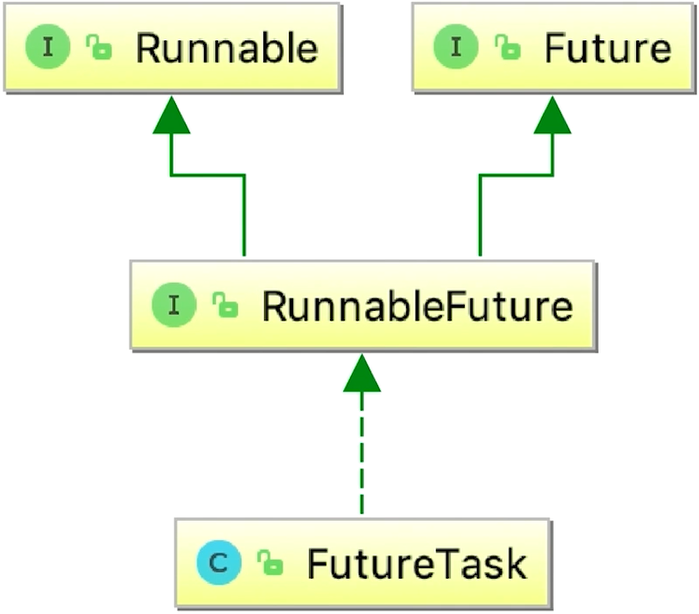Future和Callable
Future和Callable
Runnable缺陷
- 不能返回一个返回值
- 也不能抛出checked Exception
Callable接口
- 类似于Runnable,被其它线程执行的任务
- 实现call方法
- 有返回值
Future
- 可以用Future.get来获取Callable接口返回的执行结果,还可以通过Future.isDone()来判断任务是否已经执行完了,以及取消这个任务,限时获取任务的结果等
- 在call()未执行完毕之前,调用get()的线程(假定此时是主线程)会被阻塞,直到call()方法返回了结果后,此时future.get()才会得到该结果,然后主线程才会切换到runnable状态
- 所以Future是一个存储器,它存储了call()这个任务的结果,而这个任务的执行时间是无法提前确定的,因为这完全取决于call()方法执行的情况
get():获取结果
get方法的行为取决于Callable任务的状态,只有以下这5种情况:
1.任务正常完成:get方法会立刻返回结果
2.任务尚未完成(任务还没开始或进行中):get将阻塞并直到任务完成
3.任务执行过程中get方法会抛出ExecutionException这里的抛出异常,是call(执行时产生的那个异常,看到这个异常类型是java.util.concurrent.ExecutionException。不论call()执行时抛出的异常类型是什么,最后get方法抛出的异常类型都是ExecutionException。
4.任务被取消:get方法会抛出CancellationException
5.任务超时:get方法有一个重载方法,是传入一个延迟时间的如果时间到了还没有获得结果,get方法就会抛出TimeoutException。
用get(long timeout,TimeUnit unit)方法时,如果call()在规定时间内完成了任务,那么就会正常获取到返回值;而如果再指定时间内没有计算出结果,那么就会抛出TimeoutException
cancel()方法:取消任务
isDone()方法:判断线程是否执行完毕
isCanncelled()方法:判断是否被取消
线程池的submit方法返回Future对象
首先,我们要给线程池提交我们的任务,提交时线程池会立刻返回给我们一个空的Future容器。当线程的任务一旦执行完毕也就是当我们可以获取结果的时候,线程池便会把该结果填入到之前给我们的那个Future中去(而不是创建-个新的Future),我们此时便可以从该Future中获得任务执行的结果
public class OneFuture {
public static void main(String[] args) {
ExecutorService service = Executors.newFixedThreadPool(10);
Future<Integer> future = service.submit(new CallableTask());
try {
System.out.println(future.get());
} catch (InterruptedException e) {
e.printStackTrace();
} catch (ExecutionException e) {
e.printStackTrace();
}
service.shutdown();
}
static class CallableTask implements Callable<Integer> {
@Override
public Integer call() throws Exception {
Thread.sleep(3000);
return new Random().nextInt();
}
}
}
Futrue的Lambda
public class OneFutureLambda {
public static void main(String[] args) {
ExecutorService service = Executors.newFixedThreadPool(10);
Callable<Integer> callable = () -> {
Thread.sleep(3000);
return new Random().nextInt();
};
Future<Integer> future = service.submit(callable);
try {
System.out.println(future.get());
} catch (InterruptedException e) {
e.printStackTrace();
} catch (ExecutionException e) {
e.printStackTrace();
}
service.shutdown();
}
}
批量接收结果
多个任务,用Futrue数组来获取结果
public class MultiFutures {
public static void main(String[] args) throws InterruptedException {
ExecutorService service = Executors.newFixedThreadPool(20);
ArrayList<Future> futures = new ArrayList<>();
for (int i = 0; i < 20; i++) {
Future<Integer> future = service.submit(new CallableTask());
futures.add(future);
}
Thread.sleep(5000);
for (int i = 0; i < 20; i++) {
Future<Integer> future = futures.get(i);
try {
Integer integer = future.get();
System.out.println(integer);
} catch (InterruptedException e) {
e.printStackTrace();
} catch (ExecutionException e) {
e.printStackTrace();
}
}
}
static class CallableTask implements Callable<Integer> {
@Override
public Integer call() throws Exception {
Thread.sleep(3000);
return new Random().nextInt();
}
}
}
执行时异常和isDone()
/**
* 描述: 演示get方法过程中抛出异常,for循环为了演示抛出Exception的时机:并不是说一产生异常就抛出,直到我们get执行时,才会抛出。
*/
public class GetException {
public static void main(String[] args) {
ExecutorService service = Executors.newFixedThreadPool(20);
Future<Integer> future = service.submit(new CallableTask());
try {
for (int i = 0; i < 5; i++) {
System.out.println(i);
Thread.sleep(500);
}
System.out.println(future.isDone());
future.get();
} catch (InterruptedException e) {
e.printStackTrace();
System.out.println("InterruptedException异常");
} catch (ExecutionException e) {
e.printStackTrace();
System.out.println("ExecutionException异常");
}
}
static class CallableTask implements Callable<Integer> {
@Override
public Integer call() throws Exception {
throw new IllegalArgumentException("Callable抛出异常");
}
}
}
获取任务超时
/**
* 描述: 演示get的超时方法,需要注意超时后处理,调用future.cancel()。演示cancel传入true和false的区别,代表是否中断正在执行的任务。
*/
public class Timeout {
private static final Ad DEFAULT_AD = new Ad("无网络时候的默认广告");
private static final ExecutorService exec = Executors.newFixedThreadPool(10);
static class Ad {
String name;
public Ad(String name) {
this.name = name;
}
@Override
public String toString() {
return "Ad{" +
"name='" + name + '\'' +
'}';
}
}
static class FetchAdTask implements Callable<Ad> {
@Override
public Ad call() throws Exception {
try {
Thread.sleep(3000);
} catch (InterruptedException e) {
System.out.println("sleep期间被中断了");
return new Ad("被中断时候的默认广告");
}
return new Ad("旅游订票哪家强?找某程");
}
}
public void printAd() {
Future<Ad> f = exec.submit(new FetchAdTask());
Ad ad;
try {
ad = f.get(2000, TimeUnit.MILLISECONDS);
} catch (InterruptedException e) {
ad = new Ad("被中断时候的默认广告");
} catch (ExecutionException e) {
ad = new Ad("异常时候的默认广告");
} catch (TimeoutException e) {
ad = new Ad("超时时候的默认广告");
System.out.println("超时,未获取到广告");
boolean cancel = f.cancel(true);
System.out.println("cancel的结果:" + cancel);
}
exec.shutdown();
System.out.println(ad);
}
public static void main(String[] args) {
Timeout timeout = new Timeout();
timeout.printAd();
}
}
取消任务cancel
1.如果这个任务还没有开始执行,那么这种情兄最简單,任务会被正常的取消,未来也不会被执行,方法返回true。
2.如果任务已完成,或者已取消:那么cancel()方法会执行失败方法返回false。
3.如果这个任务已经开始执行了,那么这个取消方法将不会直接取消该任务,而是会根据我们填的参数mayInterruptIfRunning做判断
Future.cancel(true)适用于:
1.任务能够处理interrupt
Future.cancel(false)仅用于避免启动尚未启动的任务,适用于:
1.未能处理interrupt的任务
2.不清楚任务是否支持取消
3.需要等待已经开始的任务执行完成
FutureTask来获取Future和任务结果
- FutureTask是一种包装器,可以把Callable转化成Future和Runnable,它同时实现二者的接口

- 把Callable实例当作参数,生成FutureTask的对象,然后把这个对象当作一个Runnable对象,用线程池或另起线程去执行这个Runnable对象,最后通过FutureTask获取刚才执行的结果
/**
* 描述: 演示FutureTask的用法
*/
public class FutureTaskDemo {
public static void main(String[] args) {
Task task = new Task();
FutureTask<Integer> integerFutureTask = new FutureTask<>(task);
// new Thread(integerFutureTask).start();
ExecutorService service = Executors.newCachedThreadPool();
service.submit(integerFutureTask);
try {
System.out.println("task运行结果:"+integerFutureTask.get());
} catch (InterruptedException e) {
e.printStackTrace();
} catch (ExecutionException e) {
e.printStackTrace();
}
}
}
class Task implements Callable<Integer> {
@Override
public Integer call() throws Exception {
System.out.println("子线程正在计算");
Thread.sleep(3000);
int sum = 0;
for (int i = 0; i < 100; i++) {
sum += i;
}
return sum;
}
}
Future注意点
- 当for循环批量获取future的结果时,容易发生一部分线程很慢的情况,get方法调用时应使用timeout限制
- Future的生命周期不能后退



